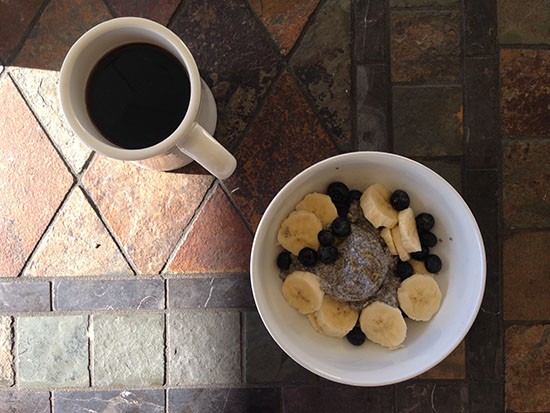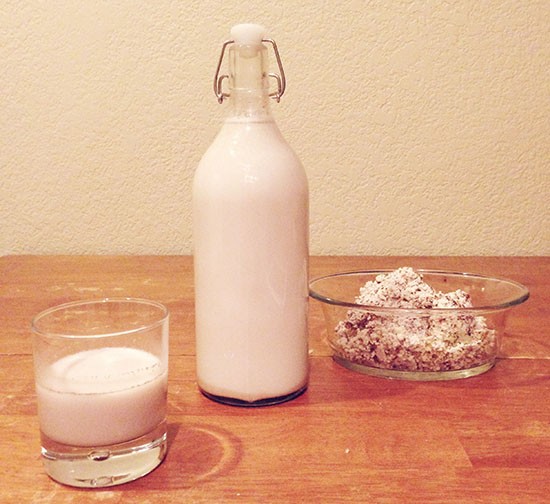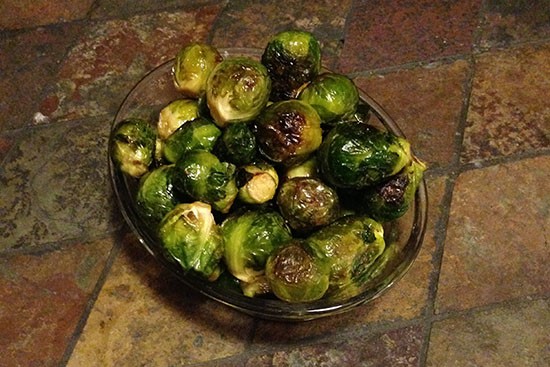
One of the principles of the Paleo diet that I set aside last week is to avoid processed foods. Why did I set it aside? Because when you're grocery shopping, avoiding processed foods is an odyssey. Grocery stores put all of the best, paleo-unfrendliest foods at the front of their stores, right next to the check out lines. Albertson's stocks freshly baked bread, which they sell for only 5 quarters, right at the very front. Are they trying to make a profit, or sabotage me?
But now that I've got the hang of eating meals without grains or snacking on processed foods, I can work on making my own foods from scratch. A good rule of thumb is if it is not made of natural ingredients, or if there is added sugar, don't eat it. This can get expensive sometimes.
]

For example, almond milk. I usually purchase my almond milk at The Growl at the Orange Circle, but it is hard to justify spending $8 for 16 ounces of almond milk if it is to become a weekly staple, since dairy is not allowed on this diet.
At first, I settled for Silk's PureAlmond unsweetened almond milk, which costs just under $4 for half a gallon. It contains almonds, filtered water, sea salt, locust bean gum (a thickening agent), sunflower lecithin (a fatty byproduct of sunflower seeds that provides foods with creaminess), gellan gum (another thickening agent), and natural flavor (which isn't necessarily that wonderful).
All of these ingredients seem harmless, but they're not all that great for you either. According to the Paleo Plan, in order to get a glass of almond milk without compromising the nutrition, you have to make it yourself. I have put doing this off for months because I thought it would be at least mildly comparable to the difficulty of milking a cow, which I imagine to be very hard. I know, apples and oranges.
In hindsight, that was totally ridiculous. All I had to do was drop a pound of organic almonds in a bowl of water, soak them for 24 hours, blend them, strain them and drink. It was a surprisingly gratifying process. Without all the thickening agents, almond milk is nice and creamy, and actually tastes like almonds (Why you'd add thickening agents, AND cream additives to store bought almond milk is beyond me). Store-bought almond milk just tastes grossafter tasting fresh almond milk.
I used some of the almond milk to soak chia seeds overnight, which turned it into a chia pudding by morning. I drizzled that with a little honey, then topped it with berries and banana. I felt, in that moment, that I had discovered the holy grail of Paleo breakfasts. The meal literally made itself and is rich in fiber, omega-3's, anti-oxidants as well as being a great source of calcium.
[

When I ate raw food for three weeks, the most rewarding aspect was that people around me started to eat healthy and became aware of the food they were eating. Once my three weeks were up I withdrew into my gluten, high fructose and processed ways because I never found a rhythm to eating completely raw. Thus, those around me returned to their own eating habits.
I am noticing a similar pattern this time around. My mom still thinks that I'm ridiculous because I won't eat beans (even after I told her about the phytates), and she would have killed me if I didn't eat her chicken because she used soy sauce, and chicken bouillon, which is horrible. But I did convert her to my almond milk, although she crushed my idea of becoming the neighborhood almond milkman — something about being liable for lawsuits and food licenses, and no one wanting to pay for it.
As I said in the previous post, I thought I would become a chest pumping meat eater. On the contrary, I've become inspired to know what is in my food and where it comes from. One night I became stumped on what to have for dinner and decided that it would be worth it to invest in a paleo cookbook.
While I really enjoyed the recipes and paleo hacks in newer books such as Practical Paleo and Against All Grains, I was more attracted to the timelessness of Alice Waters' cookbook, The Art of Simple Food, which by nature is mostly paleo-friendly. Waters, is a pioneer of organic, locally grown and sustainable foods and takes a fundamental approach to cooking — she doesn't like to use equipment, and many recipes are for basic foods: how to put together a salad with complimentary flavors, and recipes for items that are without question bought at the store, such as mayonnaise, pasta, pesto or ice cream.
So, to recap in paleo accomplishments: milk will likely not be making an appearance, and as long as I continue to make almond milk, neither will the store-bought almond milk. Also, chia pudding is an desirable breakfast food.
Maybe next week I'll boil a free-range chicken to make a natural chicken broth. Your days are numbered, chicken bouillon.
Follow Stick a Fork In It on Twitter @ocweeklyfood or on Facebook! And don't forget to download our free Best Of App here!

